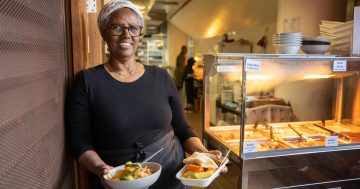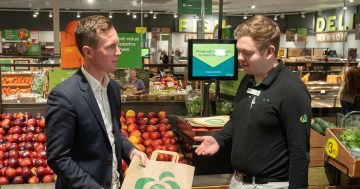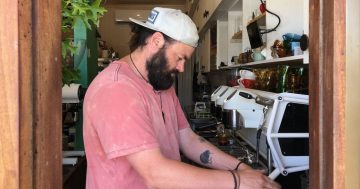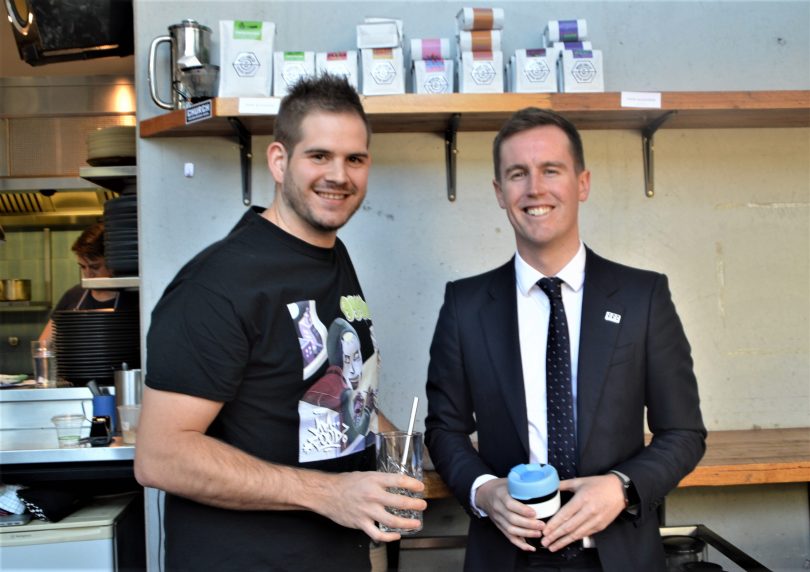
Co-owner of Teddy Picker’s cafe in Campbell, Caleb Evans (left) has replaced plastic straws with metal straws at the cafe. He is pictured with ACT City Services Minister Chris Steel. Photos by Glynis Quinlan.
A discussion paper released by the ACT Government yesterday asks for community input on how best to phase out ‘unnecessary single-use plastics’ such as plastic cutlery, polystyrene plastic food containers and disposable coffee cups.
The initiative is part of a move to reduce the amount of plastic littering the environment and the government has regulatory measures firmly in its sights.
The community is being specifically asked which single-use plastics the Government should focus out of a list that includes seven items such as plastic straws, disposable plastic plates and light-weight fruit and vegetable bags.
“We’re particularly looking at regulatory measures, whether we need to be banning certain single-use plastic items like plastic cutlery like plastic foam containers, potentially coffee cups as well to reduce the amount of plastic that’s in our environment,” said ACT City Services Minister Chris Steel.
“We now have unprecedented levels of plastic in our environment and by 2050 we expect that in our oceans there’s going to be more plastic than there is fish. We need to start acting now.
“It is still commonplace to see takeaway shops continuing to use plastic-foam takeaway containers like it is still the 1980s. Supermarkets also continue to sell plastic plates, cups and cutlery – when it seems like there are clear alternatives already being sold on their own shelves.
“It is time that the ACT takes responsible action to reduce single-use plastics and build a circular economy, where we reduce our reliance on these products and move to better alternatives.”
Mr Steel said that single-use plastic is commonly used for food packaging and includes items intended to be used only once before they are thrown away.
He said the government recognises phasing out single-use plastics could have an impact on businesses and wanted to hear from business about what the potential costs might be.
Teddy Picker’s cafe in Campbell is one of the Canberra businesses which is already moving to reduce its dependence on single-use plastics while juggling the need to be profitable.
Co-owner Caleb Evans said the cafe has replaced plastic straws with metal straws, encourages customers to use ‘keep cups’ and started using bladders of milk rather than plastic milk bottles – stopping them from regularly having to “throw away two bin loads of plastic milk bottles”.
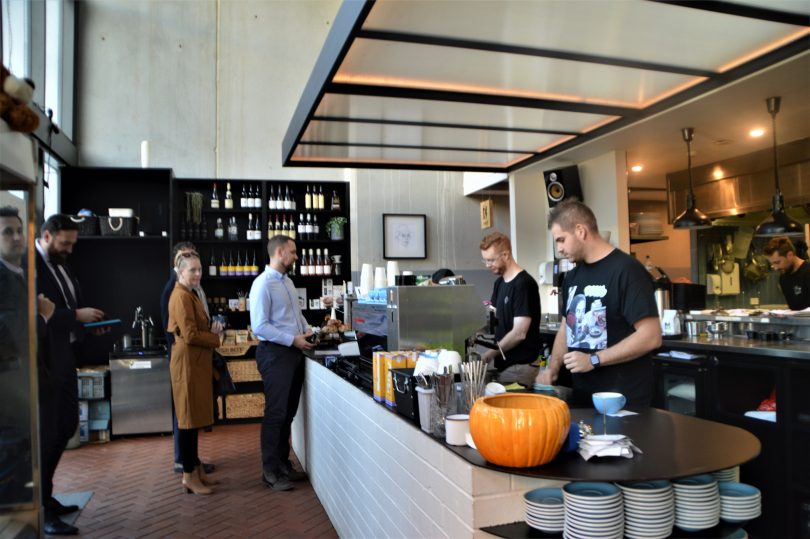
Caleb Evans (right) at work in his busy cafe which has been moving to reduce its dependence of single-use plastics.
“I guess as a small business we are still finding things that we can use and do easily that the customers don’t get too impacted but we’re actually getting a good environmental impact,” Mr Evans said.
“My sister’s doing environmental sustainability at uni. She’s pushing pretty hard on me and the metal straws were the first one – an easy one that we can do straight away.
“We’re just looking into takeaway cups at the moment for coffee which is actually a really large expense, it’s quite hard. The difference can be really big between the cheapest cup you can buy and the most expensive environmentally-friendly cups. That’s the one we’re researching,” Mr Evans said.
“We know we’re not going to make all the changes overnight because financially it’s just not feasible.
“We’ve got to research and that’s something that takes time. Pretty much every single item that we can do we’ll do.”
Mr Evans said customers have provided very good feedback about using metal straws and stressed the importance of customer engagement, particularly if replacing single-use plastics means that prices may need to go up.
“We can’t just take a 50 cent hit on every single thing that we do because we won’t survive that.”
Mr Evans said it might be good for the government to provide some support to help businesses transition away from single-use plastics and also said it would be good to have help with researching replacement products which could be used.
“It’s a lot of effort and it’s hard to find the time to sit down and find out what’s what. So if the government was saying here’s five different keep cup alternatives, there’s five different plastics that are better or here’s some bamboo takeaway things that you can use, I think that would get the ball rolling with a lot of business owners,” he said.
“I think most people want to do it, it’s just finding the time and the energy to actually make that change.”
Mr Steel said that the European Parliament last year voted to ban single-use plastics in the EU by 2021 and South Australia and the City of Hobart are also looking at phasing out single-use plastics.
He said that while the ACT has already acted to reduce single-use plastic bags, through the introduction of the plastic shopping bag ban in 2011, there is an opportunity to do more to reduce the territory’s plastic footprint.
“I encourage all interested or affected Canberrans to join the conversation and tell us their ideas and what they would like us to consider in phasing-out unnecessary and problematic single-use plastics.”
Visit www.yoursay.act.gov.au to have your say by the end of July 2019.












